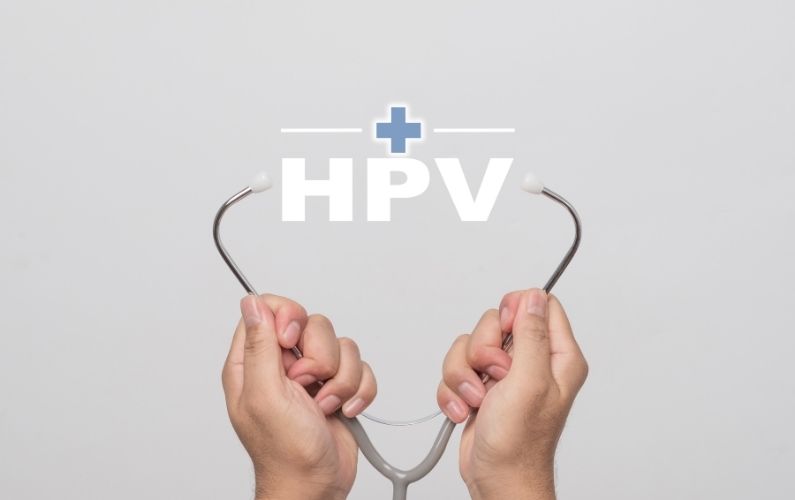What is HPV and How Do You Prevent It?

Learn what HPV is, how it spreads, and how you can protect yourself by getting the HPV vaccine.
HPV or The Human Papillomavirus is the most common sexually transmitted infection (STI). It can cause warts in various parts of the body. The body part that develops these warts depends upon the strain of the virus. In most cases, even if a person contracts this virus, they will remain asymptomatic. In other cases, where the infection becomes visible, the most common HPV symptoms include the development of warts on the genitals or surrounding skin.
HPV is usually harmless and goes away on its own without causing any serious health risks. However, if it sustains in the body, it can cause warts and sometimes even cancer.
In this post, we will review common HPV symptoms, treatment options, and preventative measures you can take. Keep reading to learn more!
HPV Symptoms
As mentioned above, the most common and visible HPV symptoms include the development of genital warts. In some cases, these warts can also appear in and around the mouth. These warts can appear as scattered or grouped bumps near genitalia. Further, genital warts can vary in shape, size, and texture. They can be small or large, rough or smooth. A practitioner can usually identify warts by visually inspecting the genital area of an infected patient (Government of Canda).
More on HPV
There are nearly 200 strains of Human Papillomavirus recognized by the scientific community, of which 40 can cause infections in human genitalia. The infection can also affect the region around the mouth; however, this is quite rare. Other kinds of HPV also cause warts on hands and feet, but these are not transmitted sexually.
Although the majority of infections are not harmful, six HPV strains can cause cancer. Only two out of these six lead to most of the cancer cases. These two come under a category called high-risk HPV. The most common region which can develop cancer is the cervix (Planned Parenthood).
How Does HPV Spread
Any sexually active person can develop an HPV infection. The infection spreads if a person is involved in vaginal, anal, or oral sex with someone who already has the virus. The most common way of transmission is through vaginal or anal sex. Even an asymptomatic person (a person who has the virus but no visible symptoms) can also be the infection source.
Once infected, a person can develop symptoms within a few days, or it may take years. This is the reason that it is challenging to know the time one became infected.

Prevention and Cure
Prevention from HPV infection can be tough as the transmission can easily occur even after using protection during sex. The use of condoms during sexual encounters certainly reduces the risk of infection, but it can by no means prevent it for sure. HPV can infect the area not covered by a condom, therefore even its proper use does not eliminate the risk of infection.
It’s important to know that there is no effective cure for HPV. However, HPV can be prevented by getting a vaccine. HPV vaccines are very effective and reduce the risk of infection immensely.
For women, regular pap smears can also help. Getting screened for cervical cancer increases the chances of early spotting of the infection, reducing the risk of developing any serious problems.
About the HPV Vaccine
The HPV vaccines provide immunity against certain strains of Human Papillomavirus. There are two variations of vaccines available for use. The HPV9 (Gardasil-9) is approved for both females and males, while HPV2 (Cervarix) is approved for only females. Both these vaccines protect from two types of HPV, responsible for nearly 70% cervical cancer cases and 80% of anal cancer cases.
The HPV9 (Gardasil-9) protects against an additional 5 HPV strains, responsible for 15 to 20% cases of cervical cancers, 11% of female anal cancers, and 4% of male anal cancers. The same vaccine also protects against 2 HPV strains that cause over 90% of genital warts cases.
Apart from occasional swelling in and around the region where the vaccine was injected, the common side effects include fatigue, soreness of muscles and headache.
Where to Get the HPV Vaccine
The vaccines are generally provided in schools and other public health facilities for free to people of certain age groups. If you can not benefit from these programs, you can still receive the vaccine from one of our Wellness Pharmacy locations.
Please contact us here if you have any questions about the HPV vaccine. We are always happy to answer your questions.
References:
Government of Canada (https://www.canada.ca/en/public-health/services/diseases/human-papillomavirus-hpv.html)
Planned Parenthood (https://www.plannedparenthood.org/learn/stds-hiv-safer-sex/hpv)
ImmunizeBC (https://immunizebc.ca/hpv)


